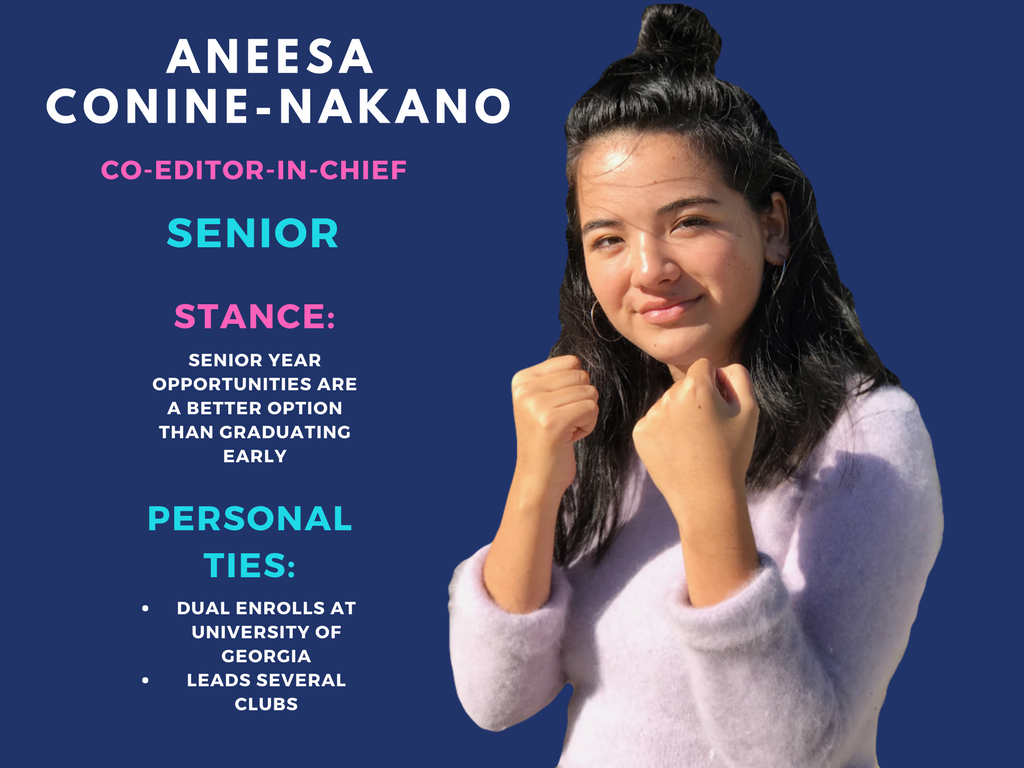Senior and Co-Editor-in-Chief Aneesa Conine-Nakano is pictured above with some facts regarding her stance on graduating early. Conine-Nakano is currently dual enrolled at the University of Georgia and is in a Work Based Learning internship. Graphic by Valeria Garcia-Pozo.
Though graduating early from high school works for some, many students would benefit from graduating on time and taking advantage of senior opportunities.
Four years and 28 credits. For most high school students, this is what will earn them their diploma. However, some students can graduate early granted the principal and superintendent waive the graduation requirement stating “they enroll in a minimum of 8 semesters of study, not including summer.”
Graduating early may benefit some students, but very few are actually prepared and ready to do it.
Supporters of graduating early may ask, “What’s the difference between a seventeen year old and an eighteen year old?”
On the surface, this one to two-year difference may not seem drastic, but in that time, the eighteen year old will have more independence, go to more social events and can gain more work experience. The younger student, who lacks those experiences, may not be prepared to live on their own, be responsible for their own academics and integrate into a new community.
For Clarke County School District students who want “alternative” options, internships, Move On When Ready programs, work-based learning and the Athens Community Career Academy (ACCA) are offered.
With these options, students can engage in opportunities off-campus, while still being involved within their school. Combined with the 15 Advanced Placement courses at Clarke Central High School, there are plenty of college-level and college preparatory courses that students can take — especially since they are free.
By taking college courses through MOWR or the ACCA, students are not financially bound to their classes and can explore more options.
If a student is unsure of what they want to do, using programs like Work Based Learning and internships can allow them to build workplace skills, without the pressure of college or the difficulty of finding internships as a college underclassman.
Senior Aneena Puthenpura participates in the internship program Young Dawgs and works in a research gene lab. For Puthenpura, this is a hands-on experience that lets her explore the field of genetics, before committing to college classes or a biology major.
The many students who are able to walk the line between high school and postsecondary education get the best of both worlds.
Additionally, there are unintended consequences for students who graduate early. On college applications, the lack of time in high school can result in less impressive extracurriculars, honors and standardized test scores. As these play a key role in college admissions and leadership development, they cannot be discounted.
And if the student is unable to get into the best college they could, if granted more time, it brings up the question whether graduating early will truly benefit them in the long run.
The traditional high school experience, at least the one that consists of parties, sporting events and school dances, is not for everyone. Academically speaking, however, high school and programs offered through it allows students to be truly prepared for college.
Graduating early and speeding up the process of maturation can do more harm than good.
More from Aneesa Conine-Nakano
Click here to read the opposing article by Sam Mattern-Parkes.
